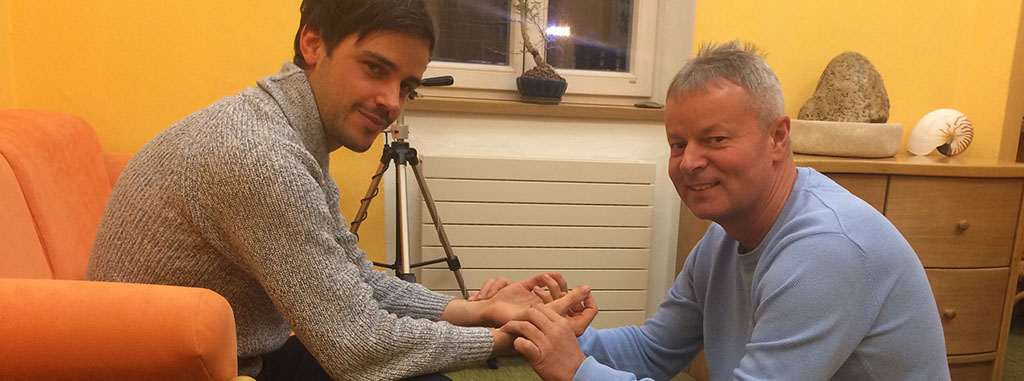Chinese Medicine: An interview with Petr Hoffmann

How Chinese medicine can help people to live healthier lives
Sometimes Dr. Petr Hoffmann is interviewed by different journalists. This interview was published in the magazine “Milk and Honey”. During the interview he discussed how Chinese medicine can help people to live healthier lives.
First of all, let’s talk a little about Chinese medicine. How does it differ from Western medicine?
Chinese medicine asks why a disease has manifested, but Western medicine asks how a disease is possible. One is about physiology and the other is about pathology. In my opinion, both are important – the Why and the How.
How do you treat ‘why’ something is happening?
I ask some general questions and discover a patient’s constitution type by looking at their tongue and checking their pulse. The rules of Chinese medicine are always the same, but the treatment depends on the creativity and flexibility of the doctor. It is like a game of tennis; the rules do not change, but some people play left handed, some right handed, and some use a big serve. The Chinese doctor knows all the rules, and he decides the best way to achieve the desired result.
How important are food choices in preventing illness?
Recently there has been a lot of research into epigenetics (genes changing through exposure to the environment). Many illnesses arise because of your environment: the pollution levels, the vaccinations you have had, and of course, the food you eat. I agree 100% with Hippocrates – food is the strongest and most effective remedy, and if you eat badly every day, you slowly poison yourself.
Today, there is a lot of conflicting information about health. How can people best navigate this?
The Czech playwright, Karel Capek, wrote: “There is nothing older than yesterdays applause.” So, be wary of revolutionary diets that are sold as “hot” or “new” because they cannot be based on much experience.
On the other hand, there is knowledge that has been around for a long time, which came from observing nature. It is simple but true. So pay attention to your intuition, and ask yourself whether the information is common sense or if it is just a way for someone to make money.
What foods would you encourage people to eat?
It depends on the individual. For example, those with a hotter constitution should lean toward foods that promote coolness, and vise versa. For example, a friend recently reported that he had been experiencing a burning sensation in his stomach. He also mentioned he had been eating raw garlic each morning as a prevention against the common cold. I knew instantly that this was the problem. The man had a red face and a hot constitution. His internal heat and the heat of the garlic were too much for his liver to bear. When I told him this, he said he thought garlic was healthy. “Yes,” I replied. “Garlic is healthy, but not for everyone. You were already hot, and now the additional heat of the garlic has set your liver on fire.” A few days later he told me he was now eating millet porridge for breakfast and it had made no difference. I asked what he ate the porridge with. He replied: “cinnamon”. No wonder it had not made any difference! Cinnamon is hot like chilli, ginger or garlic. So you see, you have to be very careful.
What foods would you encourage people to avoid?
The biggest problem right now is the quality of food. For example, people know that red meat is not good for them, so they eat white meat. But the chicken they buy is full of hormones. They eat it with the right intention – they want to be healthy – but actually cause themselves harm. So you have to be careful where you buy your food – and of course organic food is more expensive, so it is a big problem.
What can people do to improve their mental health?
This question reminds me of a story I once read. A hockey coach asked a decathlon coach how he trained athletes who were excellent at some disciplines and awful at others. The coach replied: “I used to focus on the disciplines they were not very good at, but the athletes did not improve much, and worse still, the lack of focus on the disciplines they were good at meant they became worse in these too. So now we instead focus on improving the disciplines they are already good at. This way the results are much better.” So you see, people must work with their constitution, temperament, and nature – not against it.
Do you think psychological problems can cause physical problems?
Yes, 99% of illnesses are psychosomatic. Every psychological problem causes stagnant energy in the body, which is the source of thousands of diseases. Many people refuse to accept this, but just look at how stage fright can cause sleeplessness, palpitations and diarrhoea.
Can people live healthily without it feeling like a huge hassle?
It is an interesting question. Of course people do not want the hassle, but life is complicated. Just as jaguars and snakes live in the jungle, we live in our own kind of jungle. It would be a paradise if there were no hassle, but without the rain there would be no sunshine. And sometimes, we need that thunderstorm.
How long does it take for Chinese medicine to work?
It depends on how long the patient has been ill, how deep the illness is, and how seriously they abide to the recommended regime. Ordinarily, it takes at least three months for it to work, so as you can see, with Chinese medicine a patient must be patient.
Finally, what would you say to someone who believes Chinese medicine doesn’t work?
I have not got time to persuade them, but I respect their opinion and I wish them good health for the future.


